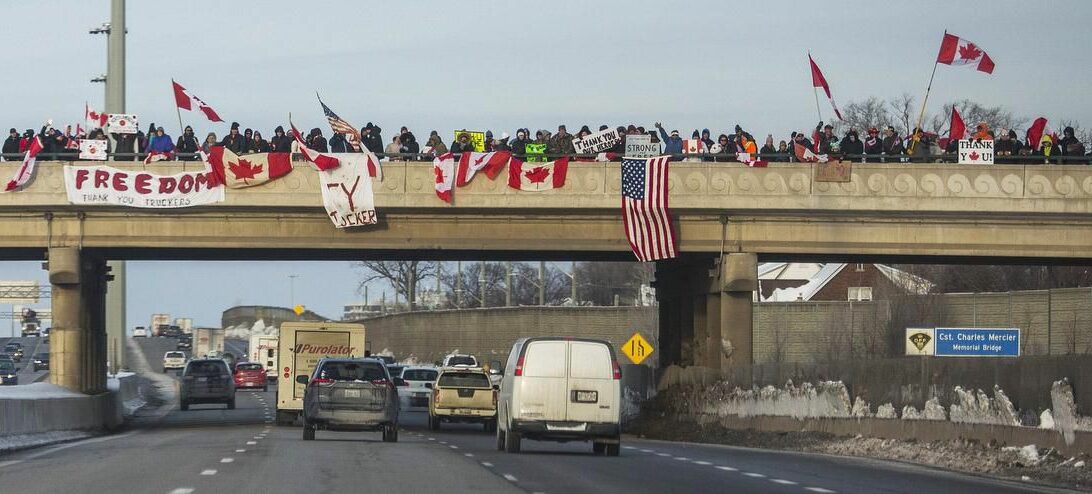Hamilton, ON. If you studied history in a Canadian school, you’ll know about the 1935 “On to Ottawa Trek.” If not, here’s a quick overview:
The Great Depression was in full swing and Prime Minister R.B. Bennett—after whom the infamous Bennett Buggy was “lovingly” named—had set up relief camps for a vast number of unemployed men all across the country. Angered over the terrible living conditions and lack of meaningful employment, a protest movement burbled to the surface. The unemployed organized and mobilized with the help of the Worker’s Unity League (WUL), a Union with known international Communist affiliations. Hundreds, then thousands, hopped onto trains to “ride the rails” across the nation on their way to the Canadian Parliament. What might change from this was anybody’s guess. But it garnered attention.
Of course, in 1935, the Bolshevik threat had many of the elites in Canada and other Western nations (rightfully) fearful that such protests from the disgruntled working masses could quickly devolve into a violent Marxist-inflected revolution. The Royal Canadian Mounted Police were ordered to put a stop to the trek in Regina, Saskatchewan, and after talks between the protest leaders and the Prime Minister failed, a riot involving thousands of people ensued. Two were killed, over 130 were arrested, and tens of thousands of dollars of damage—a lot for the 1930s—was done to the otherwise sleepy little city on the Canadian prairie.
If you study enough history, you know there’s often only a razor’s edge between constructive, responsible protest, a freedom integral to a viable democracy, and the anarchical chaos of revolution, a peculiar un-freedom that tends toward destruction. The 1930s in Germany gave rise to the deplorable conditions to which fascism seemed one, ineluctable solution. Dire times lend themselves to extremes. And we kid ourselves if we think we’re no more prone to this than any other people who came before us. This is why the Greeks and many ancients distrusted rule by the people. An unruly demos does not a good society make. Americans also know this well having just marked the one-year anniversary of the January 6 “siege” of the Capitol by self-proclaimed Patriots and Freedom fighters. While many intended to peacefully protest the election results (as unfounded as claims of fraud were), the people gathered there found themselves swept into the hysteria that saw the heart of American democracy literally and symbolically besieged. When the momentum of the mob moves, it is hard to stop.
I studied Canadian and American history. And I have taught it. And it was partially from an interest in our unfolding historical moment that my wife and I trudged through the snow and wind and the frigid -15 temps (Celsius) to watch what’s being dubbed here in Canada as “The Freedom Convoy.” At the time of this writing, the convoy is made up of thousands of trucks and has 1.5 million Canadians lining highway overpasses and service roads honking their approval and waving Canadian flags in support. (There are other flags, but more on that in a moment.) The main convoy now stretches, from some estimates, over 1000 kilometers. From all corners of the nation, the 18-wheelers are heading to Ottawa.
Triggered by Justin Trudeau and the Liberal Party’s desire to mandate vaccination for all truckers—note: 85 percent are already vaccinated and this would only affect approximately 16,000 truckers—the “Freedom Convoy” has become much more than simply an anti-vaccination or anti-vaccination-mandate movement, despite how some of the media coverage has reductively depicted it. You’ll recall that like the nurses, teachers, police, and fire fighters, truck drivers in Canada were deemed “heroes” in the early stages of the pandemic for keeping our supply lines humming despite the risks of COVID-19. Behind our locked doors, we thanked the UPS for delivering mail and the drivers bringing food (and toilet paper!) to our stores. We raised hands in solidarity from behind glass and masks. However, now the unvaccinated in many of these same vocations have been outright demonized in Canadian discourse and policy, pushed out of their jobs, and softly (or not-so-softly) pressured to get vaccinated.
But with over a million Canadians getting out in support of the convoy, it’s obviously about more than vaccines or vaccine mandates. As one of our inimitable Canadian pundits, Rex Murphy, opined, the “Freedom Convoy” has now become a “proxy” for scores of Canadians angered by the Canadian federal government’s ongoing contempt for parliamentary procedure and all-too-willing extension of its emergency powers, their coercive posture towards vaccination, their infringement of basic rights, and their seeming inability to listen to many of the Canadians most adversely affected by the on-again, off-again lockdowns that have crippled and killed small business, set many children back in their education, and seen an overwhelming wave of suicide ideation, drug overdose, and acute mental health crises among all sectors of society. All of this in response to potential disaster-scenarios that have never fully (thank God!) come to fruition.
Trudeau has summarily dismissed the convoy as “a fringe minority” with “unacceptable views,” which is a special kind of dog-whistle that has been met with an unsurprising Pavlovian reaction from Convoy supporters already convinced they are the invisible, unheard, unattended community that the ruling elites disdain. And in many ways, they are not wrong. When we shut down schools, restaurants, and businesses deemed non-essential, many of these folks bear high costs. They are not backed by powerful lobbying unions, and many have seen their livelihoods dwindle as the Walmarts and Amazons of the world have quadrupled revenue.
When the government prints out billions of dollars, the increased cost of living from hyper-inflation and the consequent devaluing of income is felt by the most vulnerable in ways that the buffered elite will never know. It is estimated that over the past two years, almost 60 percent of Canadians have had a hard time putting food on the table. More, the intellectual snobbery of saying those opposed to government mandates about vaccines have “unacceptable” views has only added fuel to the flames of a community that feels nothing but belittlement and condescension from those with the “acceptable views” that have in the past years asked/forced them to lockdown, close their businesses, homeschool their children, and, if you’re in Quebec, live by curfews and possibly even pay a tax if you refuse to get vaccinated. All of this to the steady, ongoing mantra on our highway billboards, federally sponsored radio programs, and social media pop-ups, reminding us (because it’s so easy to forget): “We’re all in this together.” We love solidarity and equality, but in the past two years it’s become very apparent, a la Orwell, that some are quite obviously more equal than others.
I say all this simply to note that I have a very soft spot in my heart for these communities. I know many people in them. I was raised in and by them. They are hard-working. They care for their families. They want limited government. They are far from stupid, and even if I disagree with their vaccine hesitance and, at times, their animosity towards any form of governance, they truly want a world for their children in which government’s wrongful encroachment into all spheres of life is actively resisted. They are compliant (we are Canadians, after all!), but only to a point. They will stand for something. And we are seeing that very clearly now.

I also say this as one with an uneasy “membership” in such communities. In my own career as a university professor (albeit in a small liberal arts university) I have a foot firmly planted in a very different community, one more aligned with the white collared “elites” that the blue collars disdain. In the past two years, my wife and I have had the privilege of flexible work, steady income, and the benefits of being buffered from the worst realities to which so many others are brutally exposed. We still found it tough—don’t get me wrong: homeschooling four children while working can be its own form of purgatory—but I’m not going to deny we’ve had it better than most. I also know that in such a world it’s become far too easy in the past couple of years to be casually dismissive of the kinds of people now lining the highways or quietly (and not-so-quietly) resisting mandates and policies enacted by institutions like churches, businesses, schools, and sports clubs. It’s become too easy to think and say aloud that these resisters are dumb, anti-science, uncaring towards their neighbours, or selfish libertarians. Our media have often portrayed many of them as xenophobic, misogynistic, or racist in order to dismiss them out of hand. To my academic peers, I encourage you to talk to members of this community. Go to the overpasses and meet the hard-working moms and dads that our society has often rendered into caricatured abstractions, and see them in their reality.
But to my peers on the bridges, I also want you to pay attention. Look closely at this movement and some of its obvious and not-so-obvious dangers. As you know, in your midst are very angry people. Next to the Canadian flags, the most popular banner being flown boldly proclaims “F— You Trudeau.” I saw a child of no more than five boldly waving this. As my wife and I walked the streets amidst thousands of these “patriots,” I had goosebumps at many of the visibly angry young men, some of them in camo and army fatigues, some even driving a military vehicle, shouting hateful slurs threatening violence on Trudeau, threatening to “occupy” Ottawa and Parliament, threatening revolution. One man in his early twenties caught me shaking my head in obvious disdain, and he got in my face, asking aggressively so his friends could hear: “Do you like that F—ing Trudeau? I bet you do.”
On the particular bridge my wife and I were on this was, admittedly, still a minority. But if you look at some of the roots of the “Freedom Convoy” it does not take much scratching to see that a deeply revolutionary spirit underwrites the ethos of many of its supporting groups, especially the more far-right contingents. Some of them are actively calling for violence. Many of them want to shut down Ottawa until demands are met. Again, protests quickly become mobs. And if we’ll live by the mob, we must be ready to die by the mob.
In my intellectual and faith tradition, there was a Dutch reformed thinker in the nineteenth century by the name of Guillaume Groen van Prinsterer. In response to the French Revolution, he clearly articulated a deep-seated fear and suspicion (akin to Burke) of the revolutionary spirit in the modern age. In fact he led a political party called the Anti-Revolutionary party of which I have proclaimed my own membership. Of course, pop musicals like Les Miserables easily stir up our revolutionary emotions: “Do you hear the people sing, singing the song of angry men?” But the song of angry men leads to burned cathedrals, stormed capitols, and an occupied gridlock of Ottawa. The Revolutionary Spirit promises—especially to the disaffected in extreme situations—a false hope in burning the status quo to the ground. It promises a new world order. It promises a reset. The Revolutionary Spirit inhabits the Left and the Right, but it must be resisted if we hope to participate in the desperately-needed, constructive work of political, cultural, and economic repair.
At the moment of this writing, the “Freedom Convoy” and all its mixed elements have remained peaceful. But we cannot underestimate how in our volatile times the simmering anger that is burbling to the surface can quickly become uncontrollable. And when I think about the vented frustrations in Regina and in Germany in the 1930s, in Washington last year, and now potentially in Ottawa as the Great Convoy reaches its destination, I worry that the more difficult, complex, work of proper nation-building will be lost in the iconoclastic verve of angry revolution. I pray it won’t. I really do. But history seems to have an ineluctable urge to rhyme.





13 comments
Teresa Morris
These Canadian truckers and those who support them are working toward the common good for the entire world. Their courageous resistance to the government totalitarianism that has stolen the dignity of every individual in their country these past two years (and even before covid) has spawned an outbreak of resistance to the evil of totalitarianism throughout the entire world, even in places such as Australia where people have been among the most oppressed. What could be more important for common good than the freedom of individuals, and the communities in which they live, from government oppression? Maybe government authorities around the world should have considered the revolutionary spirit of humans before they started categorizing individuals / businesses / vocations / religious values as essential or non-essential, isolating people from their friends and family, forcing people to hide their faces behind masks, forcing people into quarantine, etc all upon the penalty of fines and arrests for non-compliance. I’m a Texan and as such have lived my life fairly normally (no state restrictions or mandates) these past two years, except for having to deal with supply shortages, rampant inflation, etc caused by the federal government’s unwise, authoritarian response to the appearance of the virus in 2020, but my heart is with all the Canadian truckers and all the others in the world who are fighting to take back their human dignity and freedom from government authoritarians who used the excuse of a pandemic to assert power that they by no just means have over the lives of others.
Tom Laney
Solidarity for the Common Good is revolutionary.
Selfishness is not.
jvangeld
None of the people who broke windows in the US Capitol building have been identified. Presumably because they were all FBI informants. The only people who died were killed at the hands of law enforcement.
So, yes, protests like this tend to erupt into revolutionary violence, because the revolutionaries who already occupy our halls of power use force to maintain their power.
Bill Van Huisstede
My biggest frustration has been the lack of open and public discourse on the science behind all of these mandates. Not only is there no public discourse allowed, it is almost condemned. Well accredited scientists, epidemiologists, virologists, and many front line doctors have been canceled, de-platformed even vilified for speaking in opposition to the science. Also see “The Great Barrington Declaration” which has also been mistreated despite the fact that almost 60,000 medical professionals have signed off on it.
If the truckers want to have a real impact beyond what they have already accomplished, they can go home with the comfort that they indeed made a significant impact and take legal action to force open and public debate with both sides of the science table participating as well as both sides of the media table.
If this could be done, it would indeed take out both the conspiracy and the conspiracy theory arguments and bring what science is supposed to be, a process of discovery through debate from which much better and more balanced decisions can be made.
In my humble opinion, this will serve to eventually bring back peace and respect for those in authority over us. Constantly dismissing and cancelling the opposing voice only serves to fuel the fire of suspicion and discontent and this is why public protests such as the Truckers Convoy happen in the first place. It is therefore clearly the fault of media, the government and current science table that anger is rising. Blaming the convoy is a false dilemma.
Brian
Conservatives have to worry about their crowds being totally, 100% perfect. Liberals have no such worry, any violence or hate will be ignored by the media. Statues get to be ripped down, buildings get to be burned down, people get to be murdered, and their “cause” is never made illegitimate.
This asymmetry has to end, and is going to end, it’s not sustainable to live like this anymore.
William Smith
Spot on, sir! From our own Charlottesville to the “insurrection” of 06 January, we have been subjected to this!
Martin
Angry people are scary. But I’m not sure what Doug’s parenthetical (rightfully) means as an adverb of “fearful”: the 1935 protest was stopped far out west. I doubt any debutante balls in Ontario were cancelled.
Where does the anger come from? We see violence in the media — via photos a century ago and videos now. We don’t see hunger, or husbands and wives arguing over amounts of money that would be considered trivial by professionals, who even today seem generally ignorant that real wages have been flat for decades.
Globally, starvation doesn’t make news more than once or twice a year. Here in Indonesia, infant mortality has claimed more lives than SARS-2 day after day, except during the Delta wave last July-August. Drama makes news and the more we tune into it, the more we support the bread-and-circuses mentality that passes for discourse in modern academia, media, and conversations at large.
Go back to the US Declaration of Independence and you can see that those writers (who generally weren’t struggling financially) knew human nature: we will put up with nonsense until it just becomes too much. Revolutions have long fuses.
“That whenever any Form of Government becomes destructive of these ends, it is the Right of the People to alter or to abolish it, and to institute new Government, laying its foundation on such principles and organizing its powers in such form, as to them shall seem most likely to effect their Safety and Happiness. Prudence, indeed, will dictate that Governments long established should not be changed for light and transient causes; and accordingly all experience hath shewn, that mankind are more disposed to suffer, while evils are sufferable, than to right themselves by abolishing the forms to which they are accustomed.”
Tim Selles
I wonder if it might be wise to correct the “50,000 trucks” claim, as that is largely debunked. Current estimates (and counts from Thunder Bay and Kingston) put the convoy at well under 5,000 vehicles total. Still certainly substantial and worth paying attention to, but far from the organizer’s sensational claim.
Aside from that, I really appreciate your thoughts here Doug. It’s a nuanced look that is largely missing in the media coverage I have read and watched.
Jeffrey Bilbro
Thanks for that correction. We’ve updated accordingly.
Hilary (Glasbergen) Harding
I really appreciate your reflection on this. Thank you.
Jackie
I’ve looked at hope
From both sides now
From left and right
And still somehow
It’s their illusions I recall
I really don’t know
Hope at all
Good to see another Canadian on here. I’m new to the FPR and (for the most part) have enjoyed the intelligent essays and reflections. Thank you! Despite my lame attempt at summarizing my thoughts with a Joni Mitchell song, I shall try and fight my tendency to be disillusioned with politics in general.
Isn’t it George Carlin who said, “scratch any cynic and you’ll find a disillusioned idealist?”
David Naas
No matter the cause, the loudest voices declaim “Rights” and “Freedom”, while ignoring or denouncing “Duties” and “Responsibilities”.
This is not a phenomena peculiar to the Left or to the Right. “#Bothsides” seem to believe what they want trumps whatever safeguards their fellow citizens have erected, painfully, over the course of centuries, to defend real liberties against mobocracy.
Government overreach in the US, and apparently also in Canada, is also not peculiar to any “side”. Right and Left are apparently equally willing to trample on citizens in the name of some chimerical ideological nonsense. Nor does the particular level of government seem to affect this. Local governments, if left unsupervised, can wreak havoc as well as a State or National body.
Perhaps democracy is not possible, in the long run, since (as the Founders of the USA noted) it requires a virtuous people who can sustain self-rule. But I am not ready to give up on it yet.
While I may sympathize with the libertarian impulse, it is a lousy way to organize (?) a society. In the name of individual action, the thugs will inevitably take control and crush the enablers who thought anarchy was cool.
And I am certainly not about to submit to an armed Right-wing version of a “wokester” who believes, like his Left mirror-image, that Outrage is sufficient justification to Usurp.
Adam Smith
This resonates. Like you, I have one foot in sympathy with this and all the other protests, while my other foot is in academia (and I even share your specific intellectual roots – did an MA at ICS up in Toronto). Like you, I’m a long-time member of the anti-revolutionary party. I fear the mob and hate its mentality, and I’m worried about what’s coming.
And yet . . . hmm. Maybe I just have a much darker view of these policies. I really can’t wrap my mind around what’s happened over the past two years. Try as I might, I can’t find any real perspective in historical analogies. Nothing compares. Sure, these panoptic fantasies have been around for a long time, and disease has always brought fear and the desire for control. But this insane media environment, these technological capacities for surveillance – aren’t these truly unprecedented? What kind of response is required of us?
If “the more difficult, complex work of proper nation-building” can encompass uncompromising commitments to fully dismantle the insidious norms and policies that have been so rapidly installed in the name of public health, then I’m all for it. But if that work of dismantling is “revolution,” then I guess I’m a revolutionary. I think the stakes are as high as they get.
Comments are closed.